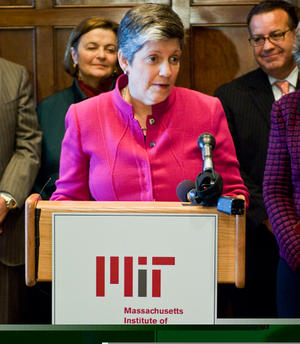Napolitano enlists MIT engineers and scientists
At a recent speech at the Massachusetts Institute of Technology (MIT), Homeland Security Secretary Janet Napolitano urged for greater private sector involvement to help develop technological solutions to secure critical infrastructure and the border; Napolitano said that technology will be the key to DHS’ future in screening passengers and cargo more effectively and efficiently; she also called for more people with cybersecurity, engineering, and science skills to assist the government; in particular, she pointed to the “data problem,” with the massive amounts of data that government agencies must sift through to detect terrorist threats, the sheer volume alone presents a logistical challenge to counter-terrorism efforts

DHS Secretary Napolitano speaking at MIT // Source: mit.edu
At a recent speech at the Massachusetts Institute of Technology (MIT), Homeland Security Secretary Janet Napolitano urged for greater private sector involvement to help develop technological solutions to secure critical infrastructure and the border.
Secretary Napolitano said that technology will be the key to DHS’ future in screening passengers and cargo more effectively and efficiently.
She stated, “At DHS, we are constantly asking and trying to answer some important questions: How do we keep travel and trade flowing across borders while at the same time enhancing security? How do we secure our nation’s critical infrastructure when the vast majority of it is in private hands?” “The answers to many of these questions involve harnessing science and technology to better meet our homeland security needs,” she explained.
As an example, Napolitano hoped that students would help design the “airport checkpoint of tomorrow,” where passengers would have to go through fewer screenings and not remove their shoes.
Given MIT’s long reputation for producing the nation’s brightest software engineers and scientists, Napolitano’s call for talented people with technical skills was particularly fitting.
She said, DHS “cannot overstate the need for software engineers and information systems designers. We need communications and data security experts, and we need this kind of talent working together to find new and faster ways to identify and separate relevant data.”
In particular, Napolitano mentioned the need to solve the nation’s “big data” problem. With the massive amounts of data that government agencies must sift through to detect terrorist threats, the sheer volume alone presents a logistical challenge to counter-terrorism efforts.
As agencies like the FBI, the CIA, and DHS begin to merge their databases and share more information on potential cyber security threats and terrorism tips, finding effective data management tools will become even more critical to effectively stopping a potential attack.
Napolitano said that the agency is constantly seeking more efficient means to analyze the “billions” of data points to draw connections and spot threats.
Following the massive destruction in Japan from a monstrous 8.9 magnitude earthquake and tsunami, Napolitano also called on scientists and engineers to help build more resilient materials for structures, improve radiation detection sensors, and improve healthcare responses to pandemics.
